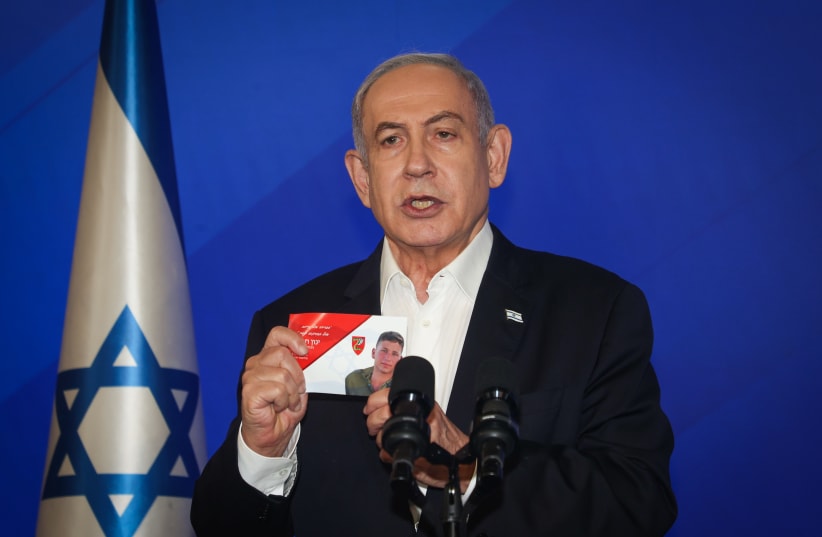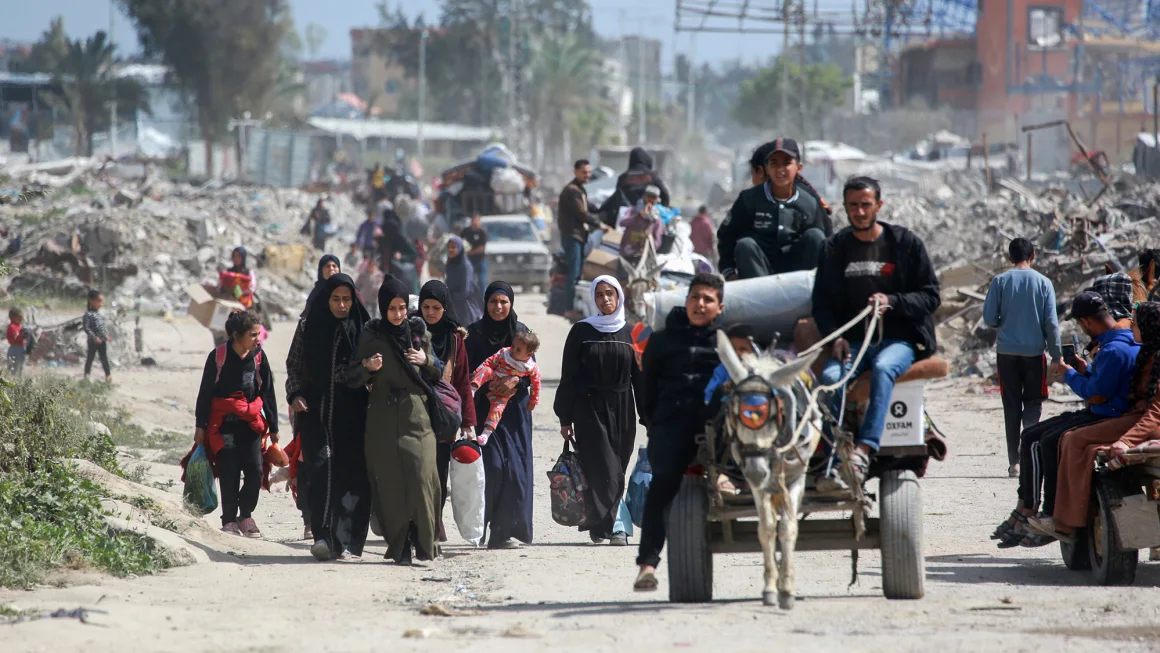Foreign
PM: Day after Netanyahu there will be a PA-run Palestinian state

This conflict between Israelis and Palestinians is not about the absence of a Palestinian state, but about the existence of the Jewish state, he said.

Prime Minister Benjamin Netanyahu linked his political future with the prevention of a Palestinian Authority-run Palestinian state, precisely as the Biden administration has been pressuring Israel to return to a two-state diplomatic process.

“I can say something about what they call the day after Netanyahu. I do not love to speak of myself in the third person. But those who speak of the day after Netanyahu are talking about the creation of a Palestinian state led by the Palestinian Authority,” the Prime Minister told reporters during a press briefing in Tel Aviv.
This conflict between Israelis and Palestinians is not about the absence of a Palestinian state, but about the existence of the Jewish state, he said.
Netanyahu at odds with the Biden administration
Netanyahu’s words put him at odds with the Biden administration, which has been Israel’s main ally in its war against Hamas.
He spoke amid speculation about increased tension between him and US President Joe Biden about the day after plans for Gaza, with the US renewing its drive for a Saudi normalization deal. This time around, the deal would more clearly include an Israeli agreement to Palestinian statehood.
Reporters have noted that it’s been several weeks since the two have spoken, even though they have been in close contact since the start of the Gaza war on October 7.
NBC reported on Wednesday that the Biden administration sought to circumvent Netanyahu by working to lay the groundwork for the day-after solutions through other Israeli politicians and civic society leaders.
In an interview with CNBC earlier this week, US Secretary of State Antony Blinken said that Arab nations would only fund the reconstruction of Gaza if Israel would agree to a path to Palestinian statehood. At the World Economic Forum, Saudi Prime Minister Faisal bin Farhan spoke of Palestinian statehood as part of a Saudi normalization deal.
According to NBC, Netanyahu rejected US and Saudi plans that include Palestinian statehood.
Public comments Netanyahu made during his Tel Aviv press conference, and those expressed by US State Department Matthew Miller seemed to indicate that the Prime Minister had indeed rebuffed initiatives tied to Palestinian statehood.
When quizzed about Netanyahu’s comments against Palestinian statehood, Miller said that Israel “faces some very difficult choices in the months ahead.”
Miller continued that “the conflict in Gaza is going to end. It will end, and at the end of that conflict, someone is going to have to rebuild Gaza, someone is going to have to govern Gaza, someone is going to have to provide security in Gaza.”
Blinken last week was able to secure commitments from Arab nations to rebuild Gaza and help establish Palestinian-led governance there, but they would only do so if there was a Palestinian state, Miller said.
The issue here is not just about Gaza, but rather how Israel resolves its long-term security issues, he said.
“For the first time in its history, you see the countries in the region who are ready to step up and further integrate with Israel, and provide real security assurance to Israel, and the US is ready to play its part, but they all have to have a willing partner on the other side,” Miller said.
The US will continue to explain that these are the opportunities and challenges before Israel, he said.
“There is no way to solve their long-term challenges, and there is no way to solve the short-term challenges” facing Palestinians and Israelis “without the establishment of a Palestinian state,” Miller said.
“We had direct conversations with him [Netanyahu], and now we are having a public conversation with him as well, but it’s going to be a process,” Miller explained.
In Tel Aviv, Netanyahu spoke with reporters about the problems connected to Israeli territorial withdrawal as a phenomenon and a strategic choice.
“Every territory that we withdraw from – terror is leveled against us,” Netanyahu said, explaining that this included southern Lebanon, Gaza, and the West Bank, which he referred to as Judea and Samaria.
This is why in any future arrangement, or even if there is not a future arrangement, “Israel must maintain security control over all the territory west of the Jordan River,” he said.
This conflicts with the idea of Palestinian sovereignty, but “there is nothing that can be done about that,” he said.
“I have explained this truth to the Americans,” he said, adding that he also prevented an attempt to impose on Israel a harmful reality.
“An Israeli Prime Minister has to be able to say ‘no’ even to our best friends. To say ‘no’ when it’s necessary and to say ‘yes’ when it’s possible,” Netanyahu said.
“This is how I behave. I have not only behaved this way, but doing so did not prevent me from enlarging the circle of peace to include four Arab nations,” Netanyahu said, referring to the 2020 Abraham Accords which normalized ties with the United Arab Emirates, Bahrain, and later Morocco.
He alluded to the possibility of a Saudi normalization deal, when he said that his diplomatic stances “will not prevent me, and I am determined to achieve this, from enlarging [the circle of peace] to include other countries in the region,” Netanyahu said.
He emphasized his determination to achieve complete victory in the Israel-Hamas war. This includes, he said, destroying the terror group, demilitarizing Hamas, local governance for Gaza, and securing the release of the hostages held in the enclave.
“The day after is the day after Hamas,” Netanyahu said, adding that many discussions have been held on this matter. It would be a mistake to begin local Palestinian governance in Gaza while Gaza is there because Hamas would likely kill those involved in civic rule.
Netanyahu emphasized that he was determined to continue the IDF military’s campaign in Gaza until Hamas was defeated.
He also pledged that he was doing everything possible to prevent a nuclear Iran, and assured the Israeli public that Israel was already executing attacks against it.
“Who says we are not attacking Iran? We are attacking,” Netanyahu said. “Iran is the head of the octopus and you see its tentacles all around, from the Houthis to Hezbollah to Hamas.”
“Iran is standing behind it. We have a conflict with Iran. Imagine not what Iran can do to us, to destroy us,” Netanyahu said.
He described a situation in which Israel is battling the proxies of the Islamic Republic on three fronts, Israel’s southern and northern borders, as well as in its waterways.
Given this reality, “imagine what [Iran] can do for the Middle East, to capture it, to destroy regimes, to control international maritime passages,” to say nothing of the global threat it presents, he said.
“Imagine, if this is what Iran is doing now, when it doesn’t have nuclear weapons, how critical it is that we stop it from acquiring nuclear weapons,” Netanyahu said.
Israel, under his leadership, has delayed Iran from producing nuclear weapons by at least 10 years, he claimed, adding that it could still do more but that he did not want to elaborate on what that was.
“I am obligated as the Prime Minister of Israel to prevent Iran from acquiring nuclear weapons, not just for our security and existence but for the protection of the entire world.”

Foreign
Hamas claims spokesperson killed in Israeli strike on northern Gaza

Earlier this week, Israel killed Ismail Barhoum, a member of Hamas’ political office, and Salah al-Bardaweel, another senior leader.

Hamas spokesman Abdel Latif al-Qanou was allegedly killed in an Israeli airstrike on northern Gaza, Hamas-affiliated news agency Shehab reported on Wednesday night.

Al-Qanoa was one of Hamas’s most prominent spokesmen in Gaza, and while he avoided media appearances during the months of fighting, he gave multiple interviews to Arab news channels after the ceasefire.
Al-Qanoua was killed when his tent was targeted in Jabaliya, the Hamas-run Al-Aqsa television reported. The same strike wounded several people, medical sources said.
Earlier this week, Israel killed Ismail Barhoum, a member of Hamas’ political office, and Salah al-Bardaweel, another senior leader.
Both Bardaweel and Barhoum were members of the 20-member Hamas decision-making body, the political office, 11 of whom have been killed since the start of the war in late 2023, according to Hamas sources.
Tents for Palestinians seeking refuge are set up on the grounds of a United Nations Relief and Works Agency for Palestine Refugees (UNRWA) centre in Khan Yunis in the southern Gaza Strip on October 19, 2023, amid the ongoing battles between Israel and the Palestinian group Hamas (credit: MAHMUD HAMS/AFP via Getty Images)
The IDF has yet to comment on the alleged elimination.
Increased IDF pressure in the Gaza Strip
Since fighting in Gaza was renewed at the beginning of last week, the IDF has killed 150 terrorists, including 10 top Hamas officials, The Jerusalem Post learned Tuesday.
In certain areas, the military has entered a full kilometer into Gaza, such as around the Nitzanim Corridor in central Gaza.
In addition to central Gaza, Beit Lahia, Beit Hanoun, parts of Khan Yunis, Shaboura, and Tel Sultan, the IDF has been evacuating and moving into Jabaliya.

Foreign
Dead Nigerians, Africans, others without will may lose unclaimed estates in UK

Hundreds of unclaimed estates reveal untold stories of African migration, wealth, and family ties left behind.
Thousands of people die every year in the United Kingdom without leaving a will or identifying next of kin, and among them are many Nigerians and other Africans whose estates—ranging from property to savings—remain unclaimed.
The UK government’s latest list of unclaimed estates, updated daily, includes over 170 entries connected to African-born individuals, with Nigerians making up a significant portion of the cases.

A Legacy Lost
For many migrants, the UK became a home away from home—a land of opportunity where they built wealth, purchased property, and created a life.

However, the absence of a will often results in their assets being classified as “bona vacantia” (ownerless goods), leaving them to the custody of the Crown.
Families back in Africa are frequently unaware of these estates, leading to a permanent loss of assets.
Cases like that of Adenike Adebiyi, who passed away in Hackney, London, in 2004, or Solomon Adekanmibi, who died in Colchester, Essex, in 2021, highlight the consequences of dying intestate.
With no identified next of kin or missing documentation, their estates remain unclaimed, and their legacies risk being forgotten.
Why It Matters
This phenomenon underscores a critical issue: many African families are unaware of their relatives’ financial situations abroad.
Migration often disrupts communication, and without clear documentation, the wealth built overseas remains beyond reach.
The loss isn’t just financial—it’s deeply cultural and emotional. Unclaimed estates represent untold family histories, connections, and the struggles of migrants who built their lives in the diaspora.
The Challenges
Lack of Awareness:
Most families in Nigeria and other African countries are unaware of their relatives’ estates abroad or how to access them.
Genealogical Gaps:
The information provided in official records is often incomplete. For example, many entries in the UK unclaimed estates list lack detailed family history or next-of-kin information.
Cultural Hesitations:
In many African cultures, discussing death and wills is considered taboo, leading to reluctance in planning for asset distribution.
A Call to Action
African governments, community organizations, and legal professionals need to raise awareness about this issue.
Here’s what can be done:
Encouraging Will Writing: Migrants in the diaspora should be educated about the importance of drafting wills to protect their assets.
Genealogical Support: Families in Africa can be assisted in tracing unclaimed estates through local or international partnerships.
Public Awareness Campaigns: Social and traditional media can highlight the importance of estate planning and share resources for families.
How to Check the List
The UK government maintains a public Unclaimed Estates List that is updated daily.
Families can search the list by name, place of birth, or other identifiers to check for potential claims.
Final Thoughts
For many Nigerians and Africans in the UK, their unclaimed estates represent more than just wealth—it’s a story of migration, resilience, and identity.
By addressing this growing issue, families can reclaim their heritage, and the legacy of those who journeyed to the diaspora need not be forgotten.
Here is the latest daily update as of March 24, 2025. Check the list

Foreign
Israel approves controversial proposal to facilitate emigration of Palestinians from Gaza

Israel’s security cabinet has approved a controversial proposal to facilitate Palestinian emigration from Gaza, a move critics warn could amount to ethnic cleansing.

Israeli Finance Minister Bezalel Smotrich on Sunday said the security cabinet approved the proposal by Defense Minister Israel Katz to organize “a voluntary transfer for Gaza residents who express interest in moving to third countries, in accordance with Israeli and international law, and following the vision of US President Donald Trump.”

The decision marks a remarkable endorsement of a plan once considered a far-right fantasy – and comes despite the prime minister’s earlier pledge not to permanently displace Gaza’s civilian population.
Critics have said that any mass displacement of Gazans in the midst of a devastating war would amount to ethnic cleansing, an act associated with war crimes and crimes against humanity under international law. Israeli officials have countered that emigration would be voluntary and in line with international legal standards.
But aid groups argue that Israel’s war has made life in Gaza nearly impossible. Martin Griffiths, the United Nations’ top emergency relief official, has called the enclave “uninhabitable,” saying its people are “witnessing daily threats to their very existence.”
The Israeli approval would establish an administration within the defense ministry “to prepare and facilitate the safe and controlled movement of Gaza residents who wish to voluntarily move to third countries,” according to a statement from the defense ministry.
Its work would include “establishing movement routes, pedestrian checks at designated crossings in the Gaza Strip,” and infrastructure to enable people to leave.
Israeli officials have presented the plan as a fulfillment of a desire by Trump to take over Gaza, expel its Palestinian population to neighboring countries and turn it into a Middle Eastern “riviera.”
The Palestinian Authority’s Minister of State for Foreign Affairs Varsen Aghabekian Shaheen told CNN’s Becky Anderson last month that Palestinians “are steadfast to stay in their land and will not move.”
Trump’s ‘vision’
Katz said Sunday that Israel is using “all means to implement the vision of the US president,” according to the defense ministry statement.
This month, Trump appeared to backtrack on his comments about displacing Palestinians, telling reporters that “nobody is expelling any Palestinians.” Steve Witkoff, the US special envoy to the Middle East, said last month that the US initiative to rebuild Gaza won’t necessarily amount to an “eviction plan” and that it was designed to “shake up everybody’s thinking.”
Last year, Israeli Prime Minister Benjamin Netanyahu said his country had no intention to displace Palestinians or occupy Gaza.
Related articleTrump says ‘nobody is expelling Palestinians,’ weeks after saying they should be moved to Arab states
“I want to make a few points absolutely clear: Israel has no intention of permanently occupying Gaza or displacing its civilian population,” Netanyahu said in a video statement in January 2024.
Trump’s proposal has, however, brought the idea further into the mainstream, with Israeli politicians now openly discussing mass emigration of Gazans as a solution to the war. And Katz last week said that Israel may maintain a permanent presence in the enclave.
Israeli rights group Peace Now criticized the plan, saying “the establishment of the administration to expel Palestinians from Gaza is one of the stupidest moves by a government that has lost all direction and logical thinking.”
The prospect has also drawn sharp rebuke from Arab leaders, especially Egypt and Jordan, who would be expected to absorb the large number of expelled Palestinians. Experts have also warned that displacing Palestinians would further destabilize the region and threaten the security of neighboring states.
Smotrich said Sunday that the security cabinet also approved the expansion of Jewish settlements in the occupied West Bank, noting that 13 areas in the West Bank would be split from existing settlements and would be recognized as independent settlements.
“Instead of hiding and apologizing – we are raising the flag, building, and settling. This is another important step on the path to actual sovereignty in Judea and Samaria,” he said, using the name by which Israelis refer to the West Bank.
The Yesha Council, an umbrella body representing Jewish settlements, said that as of January 2024, there were 150 settlements in the West Bank.
It said that the decision exposes a “long-standing lie that (Israel) does not establish new settlements, but only ‘neighborhoods’ of existing settlements” and that it is “another nail in the coffin that the Government of Israel is preparing for the only chance for a future of peace and security.”
A statement sent by Smotrich’s office said the move comes against “the backdrop of the approval of tens of thousands of housing units in Judea and Samaria and represents another significant step in the process of normalizing and regulating the settlement.”
Smotrich and other right-wing ministers have been pushing an aggressive expansion of settlements on the path to declaring Israeli sovereignty over the West Bank, which would be in defiance of international law and UN Security Council resolutions.
Israel says it will maintain ‘permanent’ presence in Gaza unless hostages are freed

-

 Politics1 week ago
Politics1 week agoOpposition leaders announce coalition to challenge Tinubu in 2027
-

 Foreign7 days ago
Foreign7 days agoHouthis declare Ben-Gurion Airport ‘no longer safe’ after renewed Gaza fighting
-

 Politics1 week ago
Politics1 week agoYahaya Bello deceptively arranging recall of Senator Natasha, desperate to replace her – Constituents
-

 News1 week ago
News1 week agoWhy Christ Embassy’s Pastor Chris holds Abuja mega crusade – Fisho
-

 Politics1 week ago
Politics1 week agoAtiku, El-rufai, Obi condemn Tinubu’s suspension of Rivers Governor, demand reversal
-

 Business1 week ago
Business1 week ago20 new millionaires emerge from Fidelity Bank GAIM 6 promo
-

 News1 week ago
News1 week agoUmeh denies receiving $10,000 with other 42 Senators to support state of emergency in Rivers
-

 Politics1 week ago
Politics1 week agoCourt did not lift senate probe ban on Natasha —Group Clarifies



















